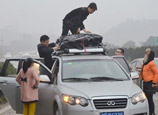
The international community is closely watching what is going on in the Democratic People's Republic of Korea, speculating whether or when it will conduct another nuclear test.
The DPRK has for long used nuclear tests (or the threat to carry out one) as a bargaining chip to draw the United States to the table and extract "concessions". The DPRK's primary diplomatic goal is to establish relations with the US to ensure its security. It wants a peace agreement to replace the current armistice agreement and the withdrawal of US forces from the Republic of Korea.
But the response from the US has been negative. US President Barack Obama does not seem keen on improving ties with the DPRK and Washington's strategic rebalancing in Asia is aimed partly at Pyongyang.
Besides, the DPRK amended its constitution in May 2012 to proclaim itself a "nuclear state", showing its determination to develop nuclear weapons to ensure its security and survival. Therefore, it should not come as a surprise if Pyongyang conducts another nuclear test in response to United Nations Security Council Resolution 2087. The resolution, approved on Jan 22 demands that Pyongyang respect UN resolution.
It is thus incumbent upon the international community to dissuade the DPRK from taking the path of nuclear tests to deal with the US, and by default the ROK (and Japan).
Though China is committed to strengthening friendship with the DPRK, it has been repeatedly asking Pyongyang to comply with Security Council resolutions, abandon the path of confrontation and agree to resume the peace process.
China did its bit to ensure that the Security Council Resolution 2087 only denounced the DPRK's satellite launch in December and warned it against launching any more ballistic missiles, or conducting another nuclear test. China's only intention for doing so was to restore peace and stability on the Korean Peninsula. But if the DPRK continues to ignore China's advice or the US and the ROK persist with their hard-line measures against the DPRK, tensions on the Peninsula will escalate further.
If the DPRK conducts a third nuclear test, it is bound to come under greater pressure from the international community. And the US and the ROK could impose more sanctions, which would undermine the DPRK's plan to develop its economy and improve its people's livelihood.
The nuclear program Pyongyang has been using as a bargaining chip may deter the US and the ROK for the time being but the tactic could eventually end in disaster, because the international community cannot support the development of nuclear weapons.
ROK president-elect Park Geun-hye's suggestion to hold dialogue with the DPRK, and former New Mexico governor Bill Richardson's and Google Executive Chairman Eric Schmidt's trip to Pyongyang have raised hopes that tensions on the Korean Peninsula could be defused.
But it is more important for the DPRK to focus on its economic development. The US and the ROK should meet the DPRK half way to ease the situation. The joint naval drill started on Monday by the United States and the ROK is inappropriate amid the intensifying tension on the Korean Peninsula, though the US has denied the drill is targeted against the DPRK. However, such drill may irritate the DPRK, which is determined to "make an important decision that would strengthen the country".
The ROK should be more prudent as it is the ROK not the US that will be the first to be affected by escalating tensions on the Peninsula.
 |
















 The journey is more important than the destination:Three people who opted for an adventure tell stories.
The journey is more important than the destination:Three people who opted for an adventure tell stories.


![]()
